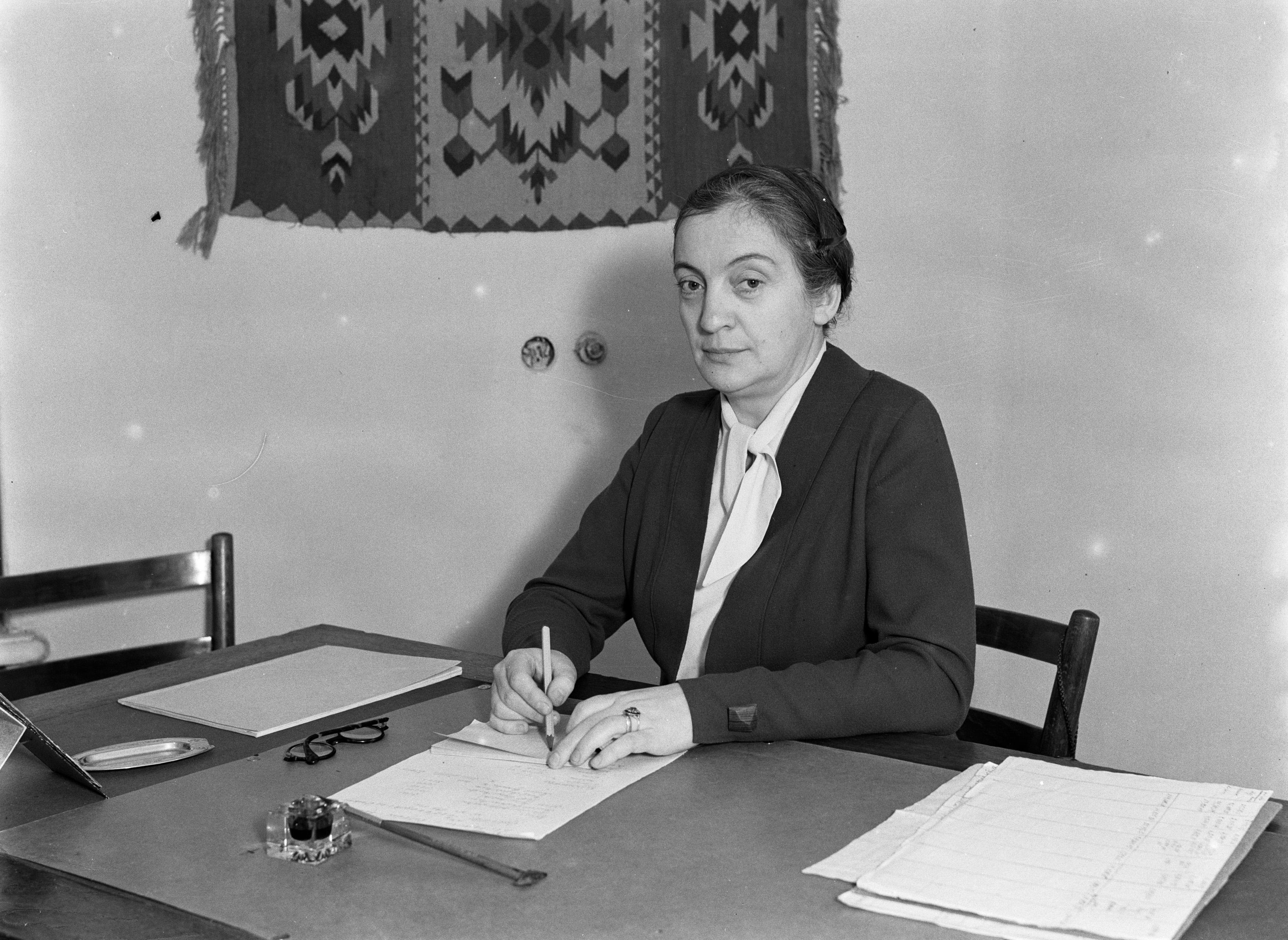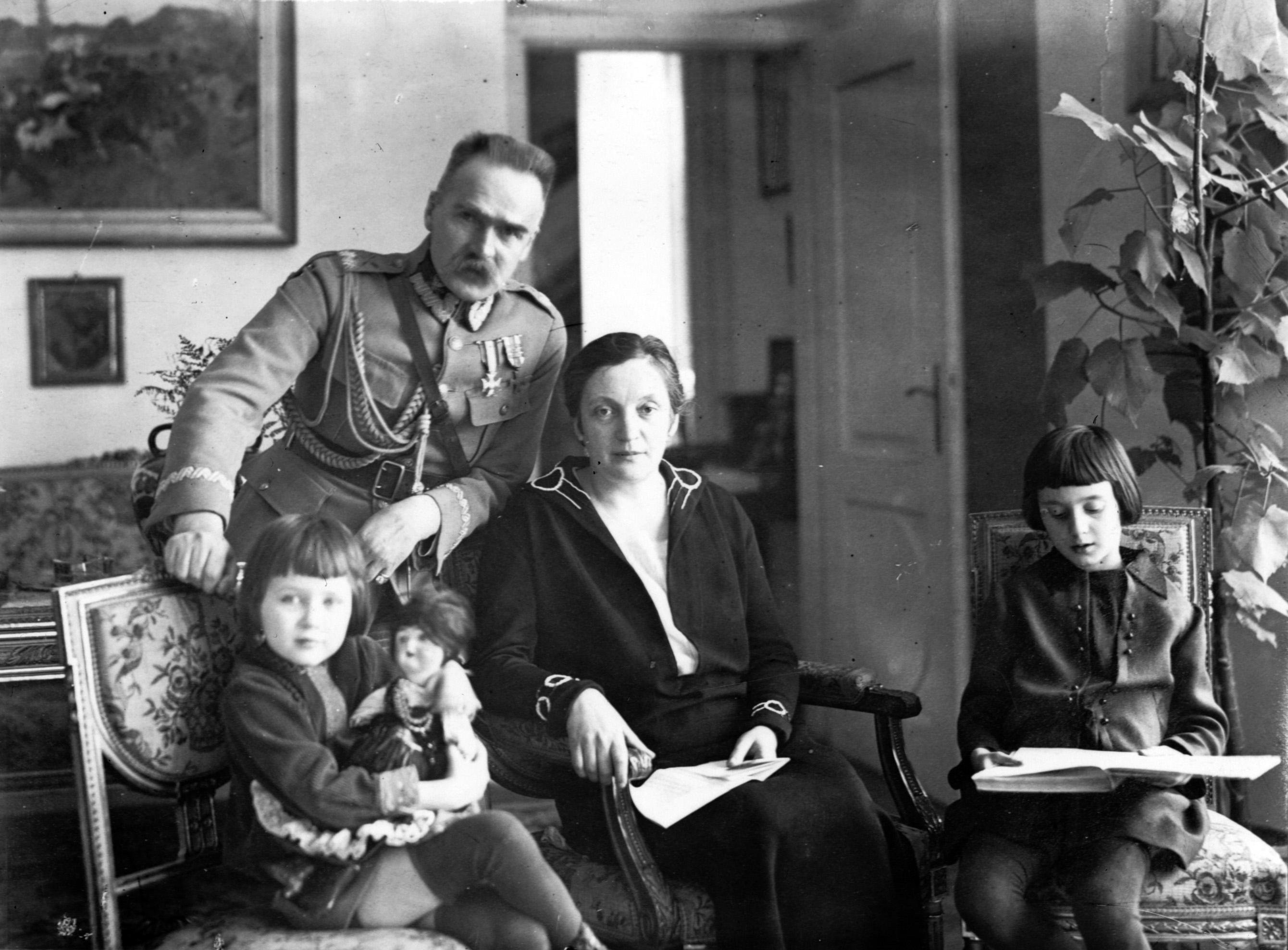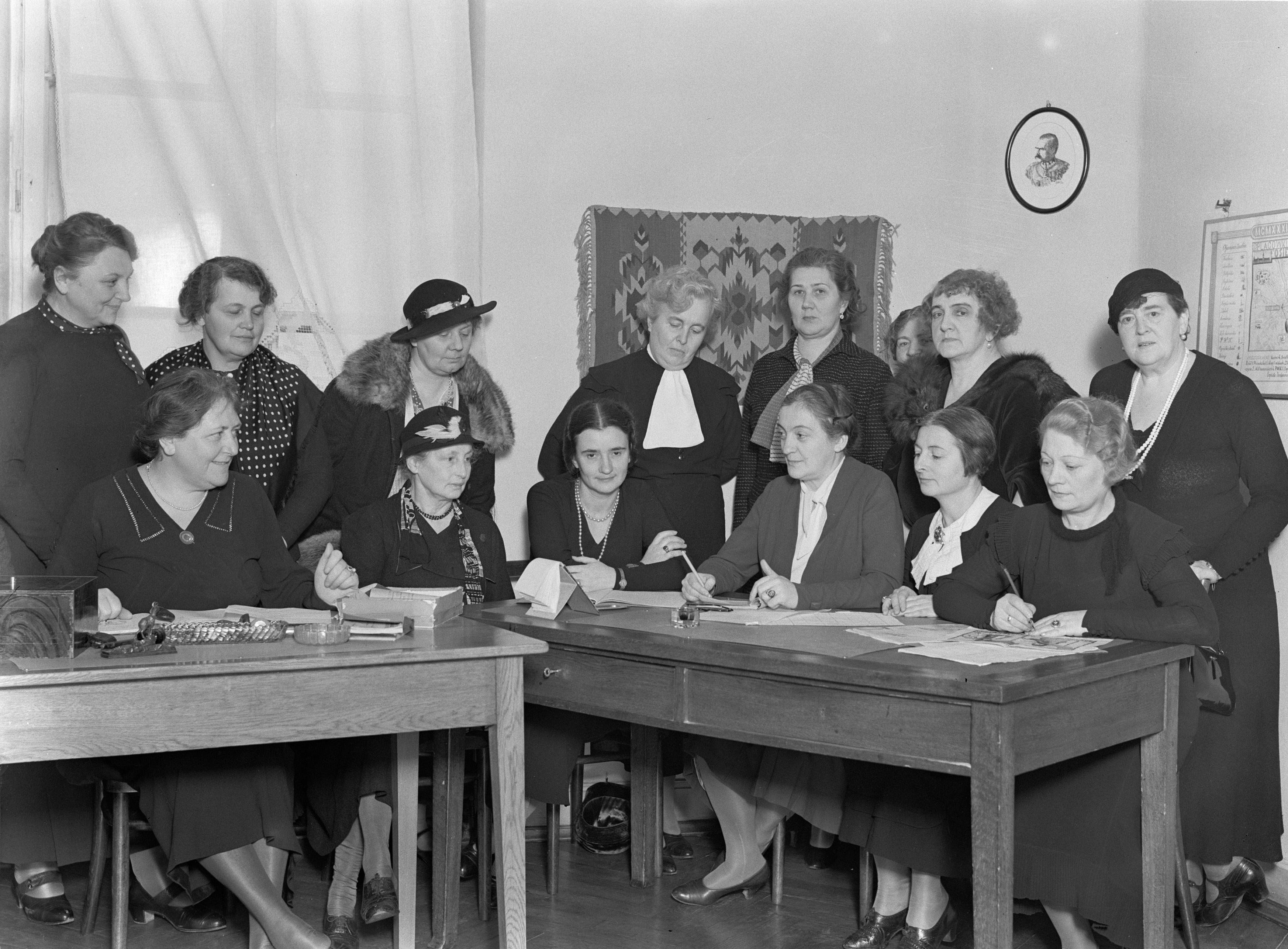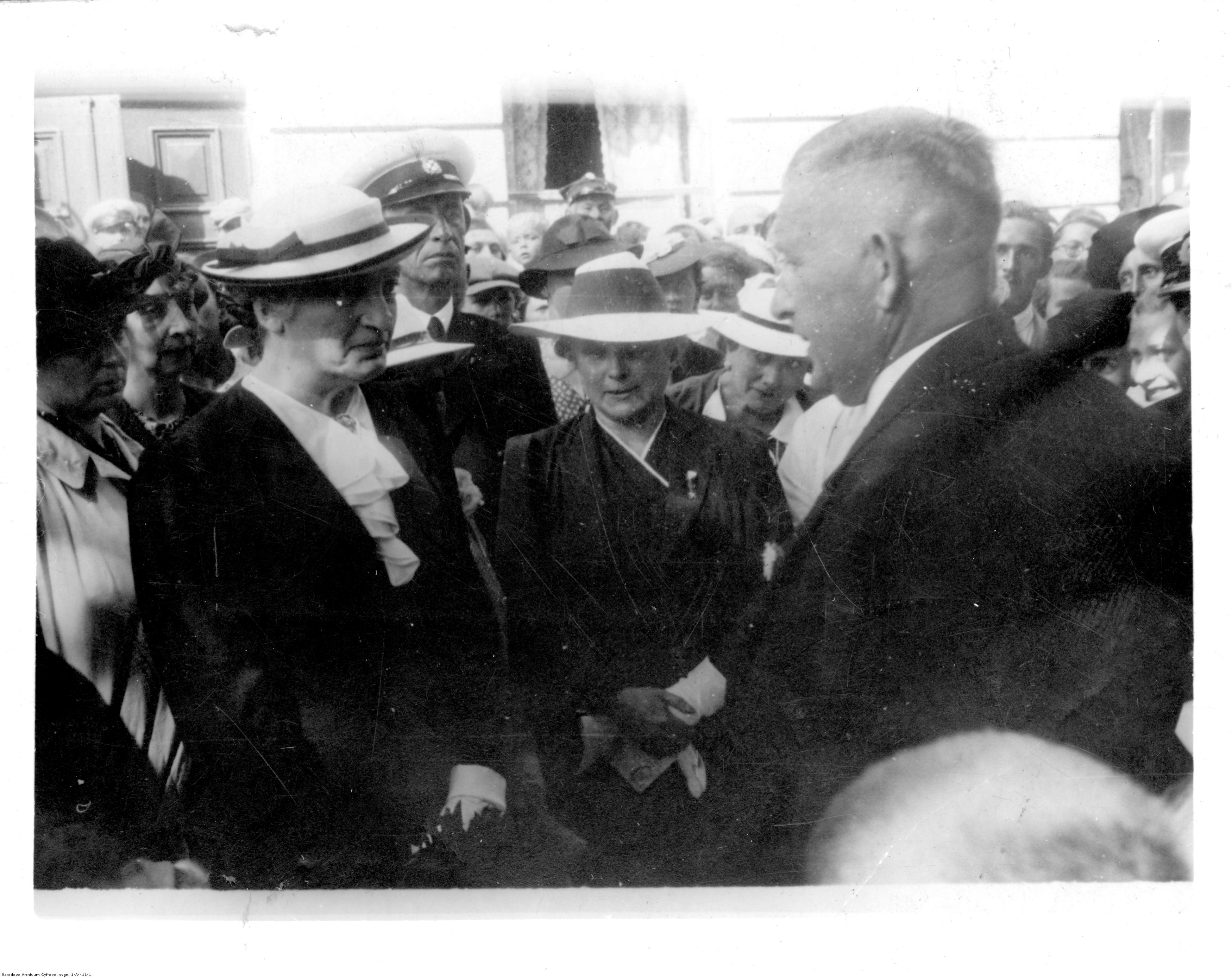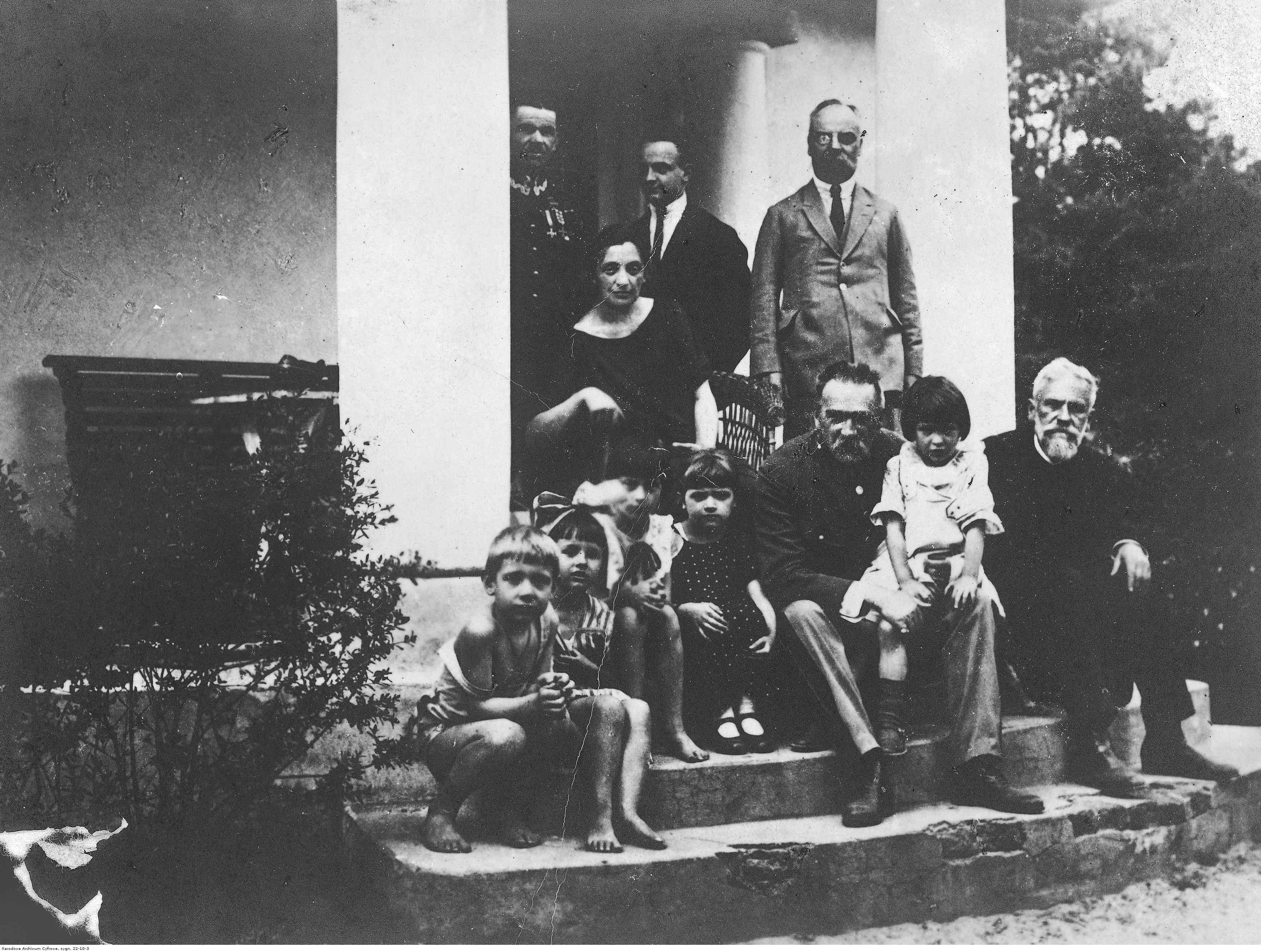In the pages of Aleksandra Piłsudska’s biography, we have evidence of her participation in numerous committees and the honours she received for being a marshal’s wife. Her biography describes with historical accuracy the events in which she took part and reflects on the role she played in them. These are facts. But Aleksandra Piłsudska’s life is also a document of a woman’s participation in the public sphere in different political periods and successive stages of her life – as a young lover, as a single mother at the side of a politician concerned above all with the fate of the state, as a partner awaiting marriage, as a good and loyal wife and as a widow in exile and guardian of the first marshal of Poland’s memory.
Née Ola Szczerbińska
Aleksandra Piłsudska, née Szczerbińska, was born in 1882 in Suwałki, in the Suwałki Governorate, Russian Empire (now Poland), into an impoverished aristocratic family. Her father, Piotr Szczerbiński, worked as a magistrate’s clerk, while her mother, Juliana Zahorska, was a housewife and mother. However, she was not able to enjoy her mother’s care for long. Aleksandra’s mother died relatively quickly as a result of her frail and deteriorating health (probably due to successive childbirths). The girl and her siblings were orphaned just two years later when their father also died. The death of both parents was not the only difficult experience young Ola had to face. At the age of three, she fell seriously ill. Doctors gave her no chance of recovery, and her parents’ only hope was prayer. On hearing the tragic diagnosis, her parents made a vow to the Blessed Mother that if their daughter survived, they would dress her exclusively in blue robes for three years – like the robes of the Virgin Mary. The wish was granted. The girl survived and, in keeping with her parents’ promise, she was dressed mainly in blue for the next few years. This gave the future marshal’s wife an aversion to the colour blue for the rest of her life.
Raised in the patriotic spirit by her grandmother
After the death of her parents, Ola and her siblings were looked after by her mother’s sister, Maria Zahorska, and her grandmother, Karolina Zahorska, née Truskolaska. It was her grandmother, a courageous woman with a strong character, who had a great influence on Aleksandra’s upbringing, and her intellectual and emotional development, and shaped her granddaughter’s patriotic attitude. Karolina Zahorska, an ardent patriot, cultivated the memory of the January Uprising (the longest-lasting insurgency in partitioned Poland in 1863–1864, against tsarist regime, aimed at the restoration of the Polish-Lithuanian Commonwealth) to the end of her life. The woman always wore a ring on her finger, a relic of the heroes of the uprising. The young Szczerbińska also grew up in the tradition of the January Uprising.
Young Aleksandra received her early education at a Russian grammar school in Suwałki, where, like many of her peers, she took secret lessons in Polish, history and literature as part of secret self-education circles. Despite the scepticism of her aunt, who defended the traditional role of women, her grandmother agreed to her granddaughter’s education. In 1903 Aleksandra graduated from the two-year Women’s Higher Commercial School in Warsaw. At the same time, she was a student at the Flying University, a secret Polish university. There she received a well-rounded education and the opportunity to work professionally in commerce and finance.
With dynamite in her corset and bullets in her skirt
In 1903, Szczerbińska took a job at A. Horn’s leather goods factory in Wola, on Dworska Street. Every day, she and her colleagues commuted by carriage to the factory in the suburbs of Warsaw. She was interested in the life and work of the industrial workers. She was able to observe working conditions in the factory, the wage levels and the conditions on the factory floor. This deepened her interest in social problems, which led her to join the Polish Socialist Party (PPS).
A year later, in 1904, she joined the ranks of the PPS and almost immediately became involved in patriotic activities, adopting the underground pseudonym ‘Ola’. Among other things, she received and stored foreign shipments of rifles, revolvers, ammunition and explosives, and coordinated their transfer to local branches of the PPS military organisation. Interestingly, the proper performance of her duties was facilitated by the female fashion of the time. Women carried weapons and ammunition in hatboxes and laundry baskets under long, full skirts. Voluminous coats, cloaks, skirts, dresses, bras and corsets made it easy to conceal many things.
‘Dynamite was excellent for the corset. Over time we became so skilled that, with up to forty pounds of ammunition or blotting paper on us, we travelled freely without arousing suspicion [...]. The worst thing was with dynamite, because was the most uncomfortable and most dangerous contraband. Any strong rubbing with a pin or whalebone from a corset and the fun was over. An additional annoyance was the fumes from the dynamite caused lethargy. After all this, you had to leave the train with a light step and a confident face, as this was the best guarantee of safety,’ Szczerbińska described in her diary. For safety of having an alibi, Szczerbińska decided to become a tutor for girls from wealthy homes. This also served as to camouflage her underground activities.
The Bezdany raid
After the split in the PPS in 1906, Szczerbińska opted for independence and remained in the PPS Revolutionary Faction, where she continued her activities. This soon led to her arrest. A year later, thanks to an informer who had infiltrated the party, she was sent to Pawiak prison. For lack of evidence, she was released after only a few months. The prison episode did not cool the girl’s enthusiasm, as evidenced by the famous 45-minute Bezdany raid, near Vilnius, in which militants attacked a mail train travelling from the Congress Poland to St Petersburg. The train was carrying more than 200,000 roubles. Alongside men (including four future prime ministers of a reborn Poland), women, including Szczerbińska, played an important role in the whole operation. At first she drew up tactical maps and carried out intelligence work, helping to plan the attack. Later she was responsible for hiding the bags of money and transporting it across the heavily guarded border into Austro-Hungarian territory. They succeeded. As Ignacy Daszyński and Władysław Pobóg-Malinowski later recalled, ‘Szczerbińska had nerves of steel.’
The action was successful and the PPS were able to continue their revolutionary activities. Among them was Aleksandra, who from then on focused her interest mainly on the territory of Galicia, where a military movement was taking shape under the auspices of Józef Piłsudski. She joined the Union of Active Struggle, which was being formed in Lviv. Despite the fact that, as a woman, she was not allowed to join the ranks, she took part in the organisation’s staff work, which was mainly related to intelligence. She also took charge of the organisation’s library and undertook the task of translating military manuals. Szczerbińska soon became one of the founders of the Assistance Association of Political Prisoners, which looked after former party activists in Russian prisons or in exile. Thin files hidden in parcels helped several exiles escape from Siberia. Meanwhile, she was part of a group of women volunteers in the Rifleman’s Movement and became a member of the women’s section of the Rifleman’s Association in Lviv.
In the service of the Fatherland
The pro-independence activities of the future Mrs Piłsudska did not end with the successful operation at Bezdany. ‘Comrade Ola’ took an active part in the organisation of the Military Commissariats of the National Government, which were being set up in the Kingdom of Poland, and soon afterwards she also took up the post of Commander of the Women’s Courier Service in the Intelligence and Courier Unit of the First Brigade of the Legions. Józef Piłsudski himself appreciated their role and effectiveness. The women not only provided him with valuable information about the Russian army, but also carried out propaganda activities, transported weapons and strategic reports prepared by the Warsaw prisoners of war. However, she was arrested again for ‘illegal agitation’ on behalf of prisoners of war and was sent to Pawiak prison, from where she was transferred to the internment camps in Szczypiorno and Lubań, where she spent a year. But even though conditions were much worse than when she was first arrested, Szczerbińska did not give up her independence activities. Released in 1916, she continued her work with the Women’s War Emergency League, carrying out inspections and maintaining contact with the league circles across the country.
Aleksandra’s patriotic activity declined considerably in 1917, following the arrest of Józef Piłsudski. As the person closest to him, she was now closely surveilled by the German police. However, there was also a second, much more important reason. In early 1918, she gave birth to her lover’s first child, a daughter named Wanda.
‘Wiktor’ and ‘Ola’
‘Here I see a man whom Siberia has not been able to break’, this is how Szczerbińska describes her first meeting with her future husband, which she says took place among baskets of arms and ammunition in a secret warehouse. When they met in 1906, Piłsudski was already a conspiratorial legend – a known enemy of the Tsarist regime and leader of the PPS Fighting Organisation. As she later wrote in her memoirs, she saw him as ‘the leader of an organisation, not as a man open to such a human emotion as love’. As it turned out, this feeling was not alien to the marshal. A friendship developed and a year later, in Kiev, Piłsudski confessed his feelings for her .
The couple did not marry until 1921, after the death of Maria Piłsudska, the marshal’s first wife, who had refused to divorce her husband. By this time they had also seen the birth of their second daughter, Jadwiga. The formalisation of their long-standing union allowed the family, who had previously lived separately, to live together – first in the Belvedere (until 1922, when Józef Piłsudski handed over the office of head of state to Gabriel Narutowicz, the first president of the Republic), and later to an acquired estate in Sulejówek. At that time, they earned a modest living from the marshal’s writing, but they were also had an extreme social conscience – together they supported a charity for the needy, which received numerous donations from Polish and foreign organisations and committees.
In Aleksandra Piłsudska’s biography, everyday life is closely linked to public life. Piłsudska, who lived with a powerful politician and soldier whose prioritised his career, had to skilfully separate the two. Her domain was to run the house, or rather the homes, to bring up her daughters, to look after them and to see to their education. She also had to look after Piłsudski and keep her marriage from falling apart.
Despite the alleged crisis in her marriage, Aleksandra Piłsudska comes across at this time as a person aware of her needs, protecting her own marriage and family and fully responding to the political atmosphere of the country. The May coup forced her to return to Warsaw. As at the beginning of the 1920s, she was once again at the side of Poland’s most important politician and took her place as the marshal’s wife. She chose to participate in the public life of the Second Republic. She was ready for independent action in the public space. Thanks to her position, she was able to support initiatives that had always been close to her heart, including women’s and children’s rights, as well as women’s military organisations.
A defender of women’s rights and the needy
Although Aleksandra Piłsudsk is remembered by the public as Józef Piłsudski’s faithful companion and second wife, her involvement in the fight for independence and equal rights for women is greater than one might think. Admittedly, these issues were also the subject of disputes in their marriage.
‘Our discussions were almost always harmonious, but we differed on one point: equal rights for women. While Piłsudski agreed that in a free Poland women should have the same rights as men, he maintained that they would not be able to exercise their rights sensibly because the female mentality was by nature conservative and easily influenced. I, a fierce feminist, was extremely indignant at this,’ the marshal’s wife wrote in her memoirs. Piłsudska regarded the granting of the right to vote to women in independent Poland as her personal achievement. As she herself later wrote: ‘[it was] not because they demanded it, but because they had won these rights through active participation in the struggle for independence’.
Mrs Piłsudska was active in helping those in need, engaging in an association that ran a day-care centre for orphans and homeless children and another that helped the poor of Warsaw. She was involved in organising soup kitchens and allotment gardens for the unemployed, libraries for young people and dental clinics. She was also active in uniform associations and veterans’ organisations. Veterans and children were close to her heart. It is therefore not surprising that the marshaless was highly respected.
Emigration
After the German invasion in September 1939, Piłsudska evacuated first to Vilnius, from where she travelled to Lithuania and then Latvia. Finally, via Sweden, she managed to reach Great Britain, where she stayed in London.
The forced departure to England and spending the rest of her life in exile changed the situation not only for Piłsudska, but also for many Polish politicians, soldiers and ordinary people. In exile, Aleksandra Piłsudska tried to remain active in Piłsudski’s political circles, to support Poles at home and to correspond with old colleagues and friends. She co-founded the Józef Piłsudski Institute, established in London in 1947, and was a member of the League of Independent Poles.
But her years in exile were also marked by a successful personal life, seeing her daughters grow up, caring for her grandchildren and spending time with her family and colleagues at the Józef Piłsudski Institute, which she helped to establish in London
Memoirs of a Marshaless
The traumatic experiences of September 1939, the fear that the Polish state would once again disappear from the map of Europe for years to come and the fear that Józef Piłsudski’s political achievements would be forgotten or misinterpreted by history, forced Piłsudska to write her memoirs. She wrote them as an eyewitness who had participated in great historical events and who, moreover, had been able to experience them at close quarters.
The memoirs are also the source of Aleksandra Piłsudska’s own biography. They were first published in English in London in 1940, and a year later in the United States. In 1960 they were translated into Polish and republished in London. They have been reprinted several times, most recently in 2004 with a historical study. Piłsudska died in 1963, but she wrote her memoirs when she was 58, when she still had a good memory. Aleksandra Piłsudska’s memoirs are therefore not part of a historical study, written many years later, often at the end of a person’s life. The memoirs were written in circumstances that very often became the motivation for writing down the events of one’s life. The outbreak of the war, the dramatic experiences of Aleksandra Piłsudska and her daughters as they fled Poland, the difficulties of making a life for themselves in exile, the lack of material resources, the fear for relatives and colleagues who had remained in the country, all justified the writing of her memoirs.
In her ‘Memoirs’, Piłsudska described several important aspects of her personal life, including her views on a number of issues and, at times, a description of her relationships with her nearest and dearest. These fragments, however, form the framework of her reflections on the past. Aleksandra Piłsudska’s memoirs are first and foremost a record of the events of Józef Piłsudski’s life and a summary of his views. They show us a woman hiding behind another man’s biography, the biography of a distinguished husband, reverently describing his achievements and sharing his views.
With due dignity
‘We cannot look at Aleksandra Piłsudska only as the wife of Józef Piłsudski and the mother of his children. We must also see her through the prism of her achievements and contribution to the fight for independence and the consolidation of independence. We must remember that she worked for years to ensure that this tradition was perpetuated and not devalued in any way’, noted Professor Grzegorz Nowik, historian of the Polish Academy of Sciences, deputy director of the J. Piłsudski Museum in Sulejówek.
Suffice to say that Aleksandra Piłsudska was awarded, among other things, the Cross of Valour and the Silver Cross of the Order of Military Virtues for the heroic courage she displayed as an activist of the PPS in the legendary operation at Bezdany in 1908, and later as an active member of the intelligence and courier unit of the First Brigade of the Polish Legions – ‘for the bravery and fortitude shown in the work for independence’.
Aleksandra Piłsudska, seen by historians mainly in relation to Piłsudski, was inscribed in the intimate sphere of the eminent politician’s life. Stories about her are written on the assumption that if she had not been Piłsudski’s wife, no one would have heard of her. Even her heroic deeds are shoehorned into this scheme. And rightly so, as there were many women who took part in momentous events and made history. However, they were much less fortunate – they did not marry or their husbands were not as famous as Marshal Piłsudski, so their names were lost and their heroism completely forgotten.
In Aleksandra Piłsudska’s biography, her private, intimate life was mixed with combatative politics and social activity. Piłsudska played many roles in her life and was either honoured or criticised for her activities and attitudes. She had to deal with both the modest tributes paid to her and the rumours spread about her. But one thing remained constant – she took care of the image of her husband, her family and herself as a serious, stable, modest person who behaved with due dignity.
***
Bibliography
Droga, K., Kobieta, którą pokochał Marszałek. Opowieść o Oli Piłsudskiej, Wydawnictwo Znak, Kraków 2018.
Piłsudska A., Wspomnienia, Warszawa 2004.
Sikorska M., Aleksandra Piłsudska (1882-1963), Łódź 2021.
Sikorska-Kowalska M., Komendantka Oddziału Kuriersko-Wywiadowczego I Brygady Legionów. Aleksandra Szczerbińska i towarzyszki broni , ‘Acta Universitatis Lodziensis’, ‘Folia Historica’, No 104, Łódź 2019.
Zaleska I., Towarzyszka „Ola” – działalność niepodległościowa Aleksandry Piłsudskiej , ‘Niepodległość i Pamięć’, No 3(63), 2018.
Dzieje.pl: Aleksandra Piłsudska
Culture.pl: Rewolucjonistka, feministka, pierwsza dama. Aleksandra Piłsudska od A do Z
Polskieradio.pl: Aleksandra Piłsudska: rewolucjonistka u boku marszałka
